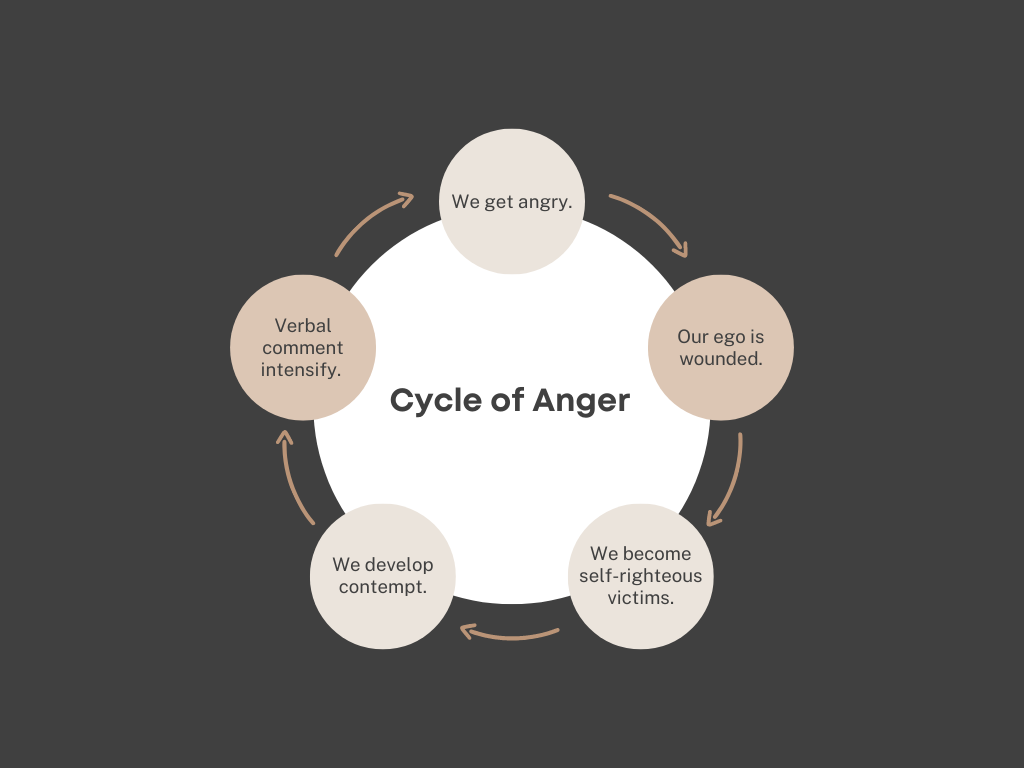Our focus scripture for how to deal with anger in a Biblical way is from Matthew 5:21-23.
Matthew 5:21-23 says, “You have heard that it was said to those of old, ‘You shall not murder; and whoever murders will be liable to judgment.’ But I say to you that everyone who is angry with his brother will be liable to judgment; whoever insults his brother will be liable to the council; and whoever says, ‘You fool!’ will be liable to the hell of fire.”
WATCH THE VIDEO BELOW BEFORE READING THE FULL BIBLE STUDY ON ANGER
The video will provide practical ways we physically experience anger and provide even more understanding of how to process and handle anger.
Anger can be the fruit of many roots. Anger arises within ourselves when we don’t live up to an expectation we place on ourselves. Anger is also something we experience when something painful or bad happens to us or those around us. When someone has treated us wrong or done something to us, anger can fill our hearts. Some fundamental beliefs that can trigger anger within us:
1. I must do well.
2. You must treat me well.
3. Following God should feel good (or be easier than this).
Types of Anger: Good and Bad
There are varying kinds of anger; some are justifiable, while others are not. Anger might arise from a wounded ego, in response to injustice in the world, or as a byproduct of emotional pain. Anger, when used maturely, can also be a response to evil. We read about righteous anger looking through the lens of Jesus.
“Righteous anger” in the Bible refers to a type of anger that is justified and moral. It’s often associated with God’s anger, which is provoked by injustice, sin, and disobedience. In this context, God’s anger is portrayed as righteous because it is aimed at correcting wrongs and restoring justice and righteousness. This type of anger is neither petty nor selfish, but rather purposeful, always aimed at reinforcing moral order and good.
Bible acknowledges righteous anger, but it also cautions that it’s challenging for human anger to be truly righteous because of our inherent fallibility and sinfulness. The expectation is to strive to respond with patience, understanding, and love, even when confronting injustice or wrongdoing.
The Fine Line Between Anger and Sin
When Paul discusses sin, it’s important to remember that he is not referring to the type of anger Jesus mentions in the scriptures. Jesus isn’t saying we should never get angry or that feeling anger is a sin in itself. Instead, he condemns “nursing a grudge” or holding onto anger.
The Meaning of “Whoever is Angry”
In this context, being “angry” implies brooding over an offense or carrying a grudge. Those harboring such resentment in their hearts towards a brother or sister will face judgment as if they were murderers.
The Implication of “Insults” and “Fool”
“Racca” translates to “insults” or considering someone “stupid.” Such behavior was answerable to the Jewish council at Jerusalem. The term “fool” implies immorality and unintelligence, similar to our modern insult “moron.” Jesus is reminding us what kind of reaction our anger can produce, which is often to speak unkind words toward others.
Jesus’ Warning Against Character Shaming
Jesus cautioned against shaming people’s character, moving from critiquing their actions to devaluing their entire being.
The “Fire of Hell”
The “fire of hell” mentioned is a place called Gehenna, a real, repulsive place outside of Jerusalem where waste was burnt and considered utterly disgusting. The term evolved over time to metaphorically represent external judgment.
Jesus is saying when we store anger in our hearts, we literally experience “hell on earth,” comparing it to Gehenna. People in Jesus’ day would know this play well. It is also in the Old Testament.
Addressing the Person versus Condemning the Person
In our responses to anger, it’s crucial to distinguish between addressing the problem caused by a person and condemning the person because of the problem.
The Role of Individual Choice
We must remember that we have a choice each day to either follow the kingdom of heaven or the kingdom of hell. If we let anger fester like a cancer within us, we’re in danger of creating our hell here and now.
The Consequences of Anger
The most significant concern is not the afterlife but rather what happens to us when our anger consumes us in the present.
Heart Posture of Anger
Murder stems from the same place in the heart where an insult is born. To eliminate murder, we need to eradicate this type of anger.
Scriptures on Reducing Anger
Scriptures such as “Get rid of all bitterness” and “quick to listen, slow to speak, slow to become angry” offer guidance on how to handle toxic anger.
Here are more scriptures:
Ephesians 4:26-27, “Be angry and do not sin; do not let the sun go down on your anger, and give no opportunity to the devil.”
Proverbs 15:18, “A hot-tempered man stirs up strife, but he who is slow to anger quiets contention.”
James 1:19-20, “Know this, my beloved brothers: let every person be quick to hear, slow to speak, slow to anger; for the anger of man does not produce the righteousness of God.”
Colossians 3:8, “But now you must put them all away: anger, wrath, malice, slander, and obscene talk from your mouth.”
Proverbs 29:11, “A fool gives full vent to his spirit, but a wise man quietly holds it back.”
Psalm 37:8, “Refrain from anger, and forsake wrath! Fret not yourself; it tends only to evil.”
Ecclesiastes 7:9, “Be not quick in your spirit to become angry, for anger lodges in the bosom of fools.”
Proverbs 14:29, “Whoever is slow to anger has great understanding, but he who has a hasty temper exalts folly.”
Ephesians 4:31-32, “Let all bitterness and wrath and anger and clamor and slander be put away from you, along with all malice. Be kind to one another, tenderhearted, forgiving one another, as God in Christ forgave you.”
Galatians 5:19-21, “Now the works of the flesh are evident: sexual immorality, impurity, sensuality, idolatry, sorcery, enmity, strife, jealousy, fits of anger, rivalries, dissensions, divisions, envy, drunkenness, orgies, and things like these. I warn you, as I warned you before, that those who do such things will not inherit the kingdom of God.”
A Seven-Stage Cycle of Anger
Beyond merely saying, “don’t get angry”, it’s crucial to understand the cycle we often go through when we get angry:
1. We get angry.
2. Our ego is wounded. Insult on identity. Insulting who we are. “How could she do this to me?”
3. We position ourselves as self-righteous victims. We condition ourselves to be the innocent victim while everyone else is the problem.
4. We develop contempt from self-righteousness. We view ourselves better than the person who wronged us. We feel good about ourselves. We write off not just their behavior but their character while we highlight their weakness and highlight our strengths. We look down our noses at people. Our “anger” shifts towards punishing the offender.
5. Verbal comments intensify the anger.
6. This unchecked anger leads to toxic behaviors, creating a type of hell on earth.
These steps can then lead to abuse.
The goal isn’t to say we will never have emotions but to not let our emotions take root and develop over time.
Anger becomes dangerous when we allow it to control us. A simple disagreement can escalate to contempt, leading us to dismiss other viewpoints and people.
The Connection Between Relationships with People and God
Your relationship with God is closely tied to your relationship with others. Jesus’s teachings indicate that a fellowship of people who resolve conflicts and do not harbor bitterness will bring joy to all its participants. In contrast, a fellowship of people in constant conflict will be like living in Gehenna.
Remember, the people of Jesus’ day knew this place well. This was how severe it was to Jesus to address our anger and properly take care of it.
What the Bible Says on How to Deal with Anger
The verses in question touch on issues of reconciliation, temptation, and sin. Here is the English Standard Version (ESV) translation of those verses:
Matthew 5:24-26, “Leave your gift there before the altar and go. First, be reconciled to your brother, and then come and offer your gift. Come to terms quickly with your accuser while you are going with him to court, lest your accuser hand you over to the judge and the judge to the guard, and you be put in prison. Truly, I say to you, you will never get out until you have paid the last penny.”
In these passages, Jesus emphasizes the importance of reconciliation and resolving disputes quickly.
During the time of Jesus, the central place of worship for the Jewish people was the Temple in Jerusalem. Jews from all over Israel, and even from distant lands, would travel there to make their offerings, especially during major religious festivals like Passover.
The distance a person would have to travel to bring their gift to the altar would thus depend on where they lived. For a Jew living in Jerusalem, the journey might only be a matter of minutes or hours on foot. But for someone living in Galilee, like Jesus and many of his followers (whom Jesus was talking to in this scripture), the journey to Jerusalem could take several days on foot. For Jews living outside of Israel, such as in Egypt, Asia Minor, or Rome, the journey could take weeks or even months, depending on the mode of travel.
It’s also important to note that the instruction Jesus gives in Matthew 5:24 about leaving your gift at the altar and being reconciled to your brother first is not necessarily about physical distance. Instead, it’s about the priority of relationships and reconciliation over religious rituals. He was teaching that it’s more important to have right relationships with others than to perform religious duties. Even if one were already at the altar in the Temple ready to make their offering, they should first go and reconcile with anyone they have wronged or who has something against them.
If it took you a few days to get to Temple and you got to Temple, and you realize the conflict you have in your heart, Jesus is saying to leave your gift, travel back home, and make it right. The distance here is what makes this significant.
Note: Jesus is not talking about abusive relationships or continuing to put yourself in harm’s way.
We hold grudges, keep a list of things people do against us, layer our pain, and continue to pretend we are okay or are righteous to hold onto our anger. Jesus is giving us clear instructions on how to begin to make this right.
I know today you have real feelings, and some of those feelings may consist of anger. Your goal isn’t to pretend or pray them away. God invites you to sit down at the table and go through them with Him. Jesus, in this passage, guides you to make the decision to make it right in your heart. (I know there are situations where you can’t make it right with the other person, which would be reconciliation, but you can make it right in your heart with God.)
5 Questions to Ask Yourself When Dealing with Anger
How does Matthew 5:21-23 redefine our understanding of anger and its consequences? What is Jesus’ teaching on anger in this passage?
Discuss the three fundamental beliefs that can trigger anger, as mentioned in the study. Can you provide personal examples of where these beliefs have led to anger in your life?
What is the difference between good and bad anger, according to this study? Can you provide examples of situations where anger can be considered a mature response to evil?
How does Jesus differentiate between addressing a person’s action and condemning the person in relation to anger? How can we apply this principle in our daily interactions?
Based on the seven-stage cycle of anger discussed in the study, can you reflect on a time when you’ve followed this cycle? What are some strategies you can implement to disrupt this cycle and manage your anger effectively?






Awesome study! Learned so much. Thankyou!
I am so glad you loved this study. Is there another emotion you would like me to cover?
Thank you so much for this. Breaking down the stages of anger has helped me see how I’ve reached the point I’m at now and hopefully how I can come back from it.
I am grateful this was a blessing!
Thank you. I am thankful for your study. It is a blessing.
I am so glad you like this study! I have a biblical study specifically on anger too you might want to get at http://www.jessicahottle.com/shop
Great study dissecting anger in the eyes of Christ. The info on culture and Biblical history in Matthew 5:24-25 helps clarify the verse. It helped me! Love it! Thank you!
I am so glad you enjoyed it Jennifer!